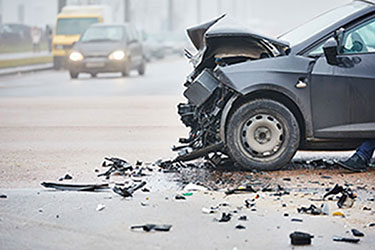Published in Personal Injury by Chris Eskew on May 12, 2020.

After being involved in a car accident, damages are assessed to determine who will pay for repairs.
If the accident resulted in injuries, you might seek compensation from the other party.
Each state follows its own rules. Some states have “no-fault” statutes, while others have fault rules.
The State of Indiana is NOT a “no-fault” state. Instead, Indiana follows “at-fault” rules for individuals involved in car accidents.
What Is “No-Fault”?
After an accident in a no-fault state, you make your insurance claim, often called a personal injury protection (PIP) claim, under your own auto insurance policy.
Your insurance will pay damages, medical bills, and certain other expenses. If your policy limit on your insurance has been reached and you are no longer able to cover remaining expenses, you may file a claim under the other party’s insurance policy or sue them for compensation.
Since Indiana is a not “no-fault” state, you can start by seeking compensation from the at-fault party’s insurance. If that coverage is insufficient, you can then file a claim based on your uninsured/underinsured motorist coverage.
It is extremely important to retain an experienced attorney to ensure that all applicable policies are considered for potential recovery and to make sure that all proper procedures and laws are followed to prevent any bars or restrictions to uninsured/underinsured motorist coverage recovery.
Minimum Car Insurance
Minimum Liability Protection
Every driver in Indiana is required to have liability insurance. The minimum amount of car insurance liability coverage is as follows:
- $25,000 for bodily injury liability per person;
- $50,000 for bodily injury liability per accident; and
- $25,000 for property damage liability per accident.
Liability insurance will pay for medical bills, damages, and injuries caused to other drivers, passengers, and pedestrians.
Uninsured/Underinsured Motorist Coverage
Aside from minimum liability insurance, all Indiana drivers must also have uninsured/underinsured motorist coverage added to their policy, unless the coverage is rejected in writing pursuant to Indiana law. Uninsured/underinsured motorist coverage provides a driver with additional coverage if the party who caused the accident does not have insurance or is an underinsured motorist.
No Pay, No Play Statutes
Indiana has also implemented “No Pay, No Play” statutes. These laws are in place so repeat non-insured motorists cannot collect non-economic damages after being involved in an auto accident. Non-economic damages include:
- Pain and suffering,
- Emotional distress,
- Physical impairment, and
- Metal anguish.
This statute applies only to those who (1) do not have liability insurance at the time of the accident and (2) violated Indiana’s financial responsibility laws within the past five years.
How Does Comparative Fault Work in Indiana?
While it is most common for one party to cause an accident, there may be instances where both parties played a role. In these situations, drivers will share fault.
In Indiana, comparative fault law allows recovery for damages as long as you are not mostly at fault. To recover damages, you must be found to be 50% or less at fault. If you are over 50% at fault, you will be barred from recovering compensation for your accident.
How Do You Determine Fault in a Car Crash?
In some accidents it will be clear who was at fault, while some accidents require some investigation. There are many ways to determine who is at fault for a car crash, including:
- Photos of the accident scene,
- Witness statements,
- A car’s black box, and
- Police reports.
Often, insurance companies will be challenging to work with and question liability to avoid paying claims. This is where an experienced personal injury attorney will be a valuable asset.
When You Should Contact a Lawyer and How Ours Can Help
After a car accident, you should contact an attorney as soon as you can. Hiring an attorney early on gets the process going, with an end goal of swift resolution and fair compensation.
At Eskew Law, we are a team of highly skilled and knowledgeable attorneys. We take a personal approach to every case and client to efficiently and adequately guide you through your case. Contact us, and let’s see how we can help you.
